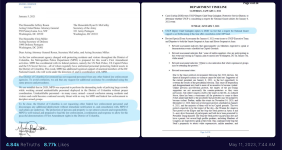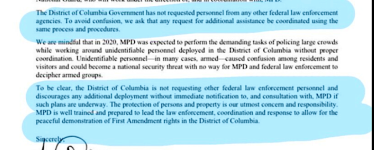Plan TrustedDES MOINES, Iowa (AP) — An Iowa woman who entered the U.S. Capitol during the Jan. 6, 2021, insurrection was sentenced Monday to five months in prison.
Deborah Sandoval, 56, pleaded guilty in December to entering a restricted building. In exchange for her plea, several other counts were dropped.
You are using an out of date browser. It may not display this or other websites correctly.
You should upgrade or use an alternative browser.
You should upgrade or use an alternative browser.
Welcome to the Precious Metals Bug Forums
Welcome to the PMBug forums - a watering hole for folks interested in gold, silver, precious metals, sound money, investing, market and economic news, central bank monetary policies, politics and more.
Why not register an account and join the discussions? When you register an account and log in, you may enjoy additional benefits including no Google ads, market data/charts, access to trade/barter with the community and much more. Registering an account is free - you have nothing to lose!
- Messages
- 37,510
- Reaction score
- 6,457
- Points
- 288
'The Donald' forum user convicted of assaulting officers on Jan. 6
Story by Ryan J. Reilly and Daniel Barnes • 1h agoWASHINGTON — A member of the pro-Donald Trump online forum "The Donald," who espoused violent rhetoric and advocated for overthrowing the government, was convicted on 10 counts on Wednesday for repeatedly assaulting law enforcement officers at the U.S. Capitol on Jan. 6.
Jose Padilla, who was arrested in Georgia in February 2021, was convicted after a bench trial before U.S. District Judge John Bates. Video shows Padilla repeatedly attacking officers on Jan. 6, including by pushing up against officers and hitting an officer with a flagpole. He has been held in custody since his arrest.
Padilla was found guilty of 10 crimes, including assaulting, resisting, or impeding certain officers; civil disorder; assaulting resisting, or impeding an officer with a deadly or dangerous weapon. He was found not guilty of just one count, which involved the mob pushing an enormous “TRUMP 2020: KEEP AMERICA GREAT!” against a police line because Bates found the evidence of Padilla's intent in that incident "ambiguous."
More:
Fake News!'The Donald' forum user convicted of assaulting officers on Jan. 6
Story by Ryan J. Reilly and Daniel Barnes • 1h ago
WASHINGTON — A member of the pro-Donald Trump online forum "The Donald," who espoused violent rhetoric and advocated for overthrowing the government, was convicted on 10 counts on Wednesday for repeatedly assaulting law enforcement officers at the U.S. Capitol on Jan. 6.
Jose Padilla, who was arrested in Georgia in February 2021, was convicted after a bench trial before U.S. District Judge John Bates. Video shows Padilla repeatedly attacking officers on Jan. 6, including by pushing up against officers and hitting an officer with a flagpole. He has been held in custody since his arrest.
Padilla was found guilty of 10 crimes, including assaulting, resisting, or impeding certain officers; civil disorder; assaulting resisting, or impeding an officer with a deadly or dangerous weapon. He was found not guilty of just one count, which involved the mob pushing an enormous “TRUMP 2020: KEEP AMERICA GREAT!” against a police line because Bates found the evidence of Padilla's intent in that incident "ambiguous."
More:
- Messages
- 1,620
- Reaction score
- 2,275
- Points
- 298
Publish it anyway. Some won't notice, and you will have added another point to your lib position.Fake News!
- Messages
- 37,510
- Reaction score
- 6,457
- Points
- 288
From the link:
WASHINGTON – A former FBI supervisory special agent was charged with entering the Capitol unlawfully and cheering violence against police protecting the building during the riot Jan. 6, 2021, according to court records.
Jared Wise, 50, of Bend, Oregon, was videotaped allegedly entering the Capitol among the first of the rioters at about 2:23 p.m. through a Senate wing door and exiting through a window next to the door about 2:32 p.m., according to court records. He later allegedly encouraged rioters attacking police officers to “kill ‘em,” according to court records.
WASHINGTON – A former FBI supervisory special agent was charged with entering the Capitol unlawfully and cheering violence against police protecting the building during the riot Jan. 6, 2021, according to court records.
Jared Wise, 50, of Bend, Oregon, was videotaped allegedly entering the Capitol among the first of the rioters at about 2:23 p.m. through a Senate wing door and exiting through a window next to the door about 2:32 p.m., according to court records. He later allegedly encouraged rioters attacking police officers to “kill ‘em,” according to court records.
You thought of that all by yourself didn't ya. All your fellow Qvidians rotting in jail thank you for the help.Publish it anyway. Some won't notice, and you will have added another point to your lib position.
Farpdinkle
Fly on the Wall
- Messages
- 76
- Reaction score
- 138
- Points
- 103
Well, at least he has cogent thoughts.
Well, at least he has cogent thoughts.
Wow that really helps your fellow Qvidians rotting in jail, making a dumb comment on a PM forum.
Any of you Qvidians ever try to help those people who got rounded up and sent into those holding pens the last two years instead of deny, deny, deny? A go fund me? Help with lawyers? A stick of chewing gum? Nah just post dumb comments on a PM forum, that will help.
Farpdinkle
Fly on the Wall
- Messages
- 76
- Reaction score
- 138
- Points
- 103
Another nonproductive post. Maybe try something constructive, enlightening, edifying. Such posts make people want to come here and spend some of their precious time.Wow that really helps your fellow Qvidians rotting in jail, making a dumb comment on a PM forum.
Any of you Qvidians ever try to help those people who got rounded up and sent into those holding pens the last two years instead of deny, deny, deny? A go fund me? Help with lawyers? A stick of chewing gum? Nah just post dumb comments on a PM forum, that will help.
Everything else is just pixilated twaddle, a waste of their time.
Last edited:
- Messages
- 19,677
- Reaction score
- 11,677
- Points
- 288
Just found this

By Steve Mariotti, Contributor
Steve Mariotti is the founder of the Network for Teaching Entrepreneurship (NFTE) and an advocate for entrepreneurs worldwide.
Sep 2, 2016, 02:25 PM EDT|Updated Sep 27, 2016
This post was published on the now-closed HuffPost Contributor platform. Contributors control their own work and posted freely to our site. If you need to flag this entry as abusive, send us an email.
The frightening implications of the National Defense Authorization Act (NDAA)

In 2014 alone, terrorism killed nearly 30,000 men, women and children. As horrible as this is, terrorism may not be the worst threat to freedom that we face. The real threat is how quickly we Americans have given our government carte blanche to fight the War on Terror. This has already caused far greater damage to our civil liberties than the terrorists themselves could ever hope to achieve.
In 2012, the U.S. Congress passed the National Defense Authorization Act (NDAA) with relatively little attention from the media―despite the freedoms it obliterated. The NDAA was enacted to empower the U.S. military to fight the war on terror. But buried in this law are two provisions (Sections 1021 and 1022) that authorize the indefinite military detention, without charge or trial, of any person labeled a “belligerent”―including an American citizen.
These NDAA provisions (which have been re-approved by Congress and signed by President Obama every year since 2012) override habeas corpus―the essence of our justice system. Habeas corpus is the vital legal procedure that prevents the government from detaining you indefinitely without showing just cause. When you challenge your detention by filing a writ of habeas corpus, you must be promptly brought before a judge or into court, where lawful grounds must be shown for your detention or you must be released.
Under Section 1021, however, anyone who has committed a “belligerent act,” can be detained indefinitely, without charges or trial, as a “suspected terrorist.” This is a direct violation of the U.S. Constitution and our Bill or Rights. In The Federalist No. 84, Alexander Hamilton stressed the importance of the writ of habeas corpus to protect against “the favorite and most formidable instruments of tyranny.”
more

 www.huffpost.com
www.huffpost.com
Dear Americans: This Law Makes It Possible To Arrest And Jail You Indefinitely Anytime
Terrorism may not be the worst threat to freedom that we face.
By Steve Mariotti, Contributor
Steve Mariotti is the founder of the Network for Teaching Entrepreneurship (NFTE) and an advocate for entrepreneurs worldwide.
Sep 2, 2016, 02:25 PM EDT|Updated Sep 27, 2016
This post was published on the now-closed HuffPost Contributor platform. Contributors control their own work and posted freely to our site. If you need to flag this entry as abusive, send us an email.
The frightening implications of the National Defense Authorization Act (NDAA)

In 2014 alone, terrorism killed nearly 30,000 men, women and children. As horrible as this is, terrorism may not be the worst threat to freedom that we face. The real threat is how quickly we Americans have given our government carte blanche to fight the War on Terror. This has already caused far greater damage to our civil liberties than the terrorists themselves could ever hope to achieve.
In 2012, the U.S. Congress passed the National Defense Authorization Act (NDAA) with relatively little attention from the media―despite the freedoms it obliterated. The NDAA was enacted to empower the U.S. military to fight the war on terror. But buried in this law are two provisions (Sections 1021 and 1022) that authorize the indefinite military detention, without charge or trial, of any person labeled a “belligerent”―including an American citizen.
These NDAA provisions (which have been re-approved by Congress and signed by President Obama every year since 2012) override habeas corpus―the essence of our justice system. Habeas corpus is the vital legal procedure that prevents the government from detaining you indefinitely without showing just cause. When you challenge your detention by filing a writ of habeas corpus, you must be promptly brought before a judge or into court, where lawful grounds must be shown for your detention or you must be released.
Under Section 1021, however, anyone who has committed a “belligerent act,” can be detained indefinitely, without charges or trial, as a “suspected terrorist.” This is a direct violation of the U.S. Constitution and our Bill or Rights. In The Federalist No. 84, Alexander Hamilton stressed the importance of the writ of habeas corpus to protect against “the favorite and most formidable instruments of tyranny.”
more

Dear Americans: This Law Makes It Possible To Arrest And Jail You Indefinitely Anytime
Terrorism may not be the worst threat to freedom that we face.
And they'll keep doing it from now on until it just becomes the normal way of government operating, and most people can't remember anything else.These NDAA provisions (which have been re-approved by Congress and signed by President Obama every year since 2012) override habeas corpus―the essence of our justice system
....and then they'll write a law to make it all sound legal. Just like the gov did when it declared an emergency and added American citizens to the definition of "the enemy" so that they could be regulated as such.
The ndaa and so-called patriot act are part 2.
Just wait'll you see part 3. It'll knock your socks off.
- Messages
- 37,510
- Reaction score
- 6,457
- Points
- 288
Well, at least he has cogent thoughts.
Another nonproductive post. Maybe try something constructive, enlightening, edifying. Such posts make people want to come here and spend some of their precious time.
Farp..............you said a few things like this in the Dominion vs Fox thread not too long ago. Please try to remember that no matter what you believe, no matter what your opinion is, other people have their own beliefs and opinions and are deserving of the same respect that you want for yourself.
Also..........please feel free to pm me should you feel the need to get something off your chest. I assure you we'll talk, and no subject will be off the table.
Thanks.
Farpdinkle
Fly on the Wall
- Messages
- 76
- Reaction score
- 138
- Points
- 103
Tell me why some people can address a post that attacks another person without you pretending to moderate, but you choose to address those with whom you tend to disagree. For example:
Your duplicity is striking.
Does that post ^^^^ provide the "respect you want for yourself"? Where is your posted admonishment on that one?You thought of that all by yourself didn't ya. All your fellow Qvidians rotting in jail thank you for the help.
Your duplicity is striking.
Last edited:
Please keep public discussion on topic everyone. There is no need for anyone to get personal with comments here. If someone posts something that violates the forum guidelines, please use the "report" link at the bottom of the post to bring it to the moderating team's attention. Thanks.
- Messages
- 37,510
- Reaction score
- 6,457
- Points
- 288
Fri, May 5, 2023 at 5:19 PM EDT·1 min read
WASHINGTON (AP) — A Kentucky man with a long criminal record was sentenced Friday to a record-setting 14 years in prison for attacking police officers with pepper spray as he stormed the U.S. Capitol with his wife.
Peter Schwartz’s prison sentence is the longest so far among hundreds of Capitol riot cases. The judge who sentenced Schwartz also handed down the previous longest sentence — 10 years — to a retired New York Police Department officer who assaulted a police officer outside the Capitol on Jan. 6, 2021.

 news.yahoo.com
news.yahoo.com
WASHINGTON (AP) — A Kentucky man with a long criminal record was sentenced Friday to a record-setting 14 years in prison for attacking police officers with pepper spray as he stormed the U.S. Capitol with his wife.
Peter Schwartz’s prison sentence is the longest so far among hundreds of Capitol riot cases. The judge who sentenced Schwartz also handed down the previous longest sentence — 10 years — to a retired New York Police Department officer who assaulted a police officer outside the Capitol on Jan. 6, 2021.
Man gets 14 years in 1/6 case, longest sentence imposed yet
A Kentucky man with a long criminal record was sentenced Friday to a record-setting 14 years in prison for attacking police officers with pepper spray as he stormed the U.S. Capitol with his wife. Peter Schwartz’s prison sentence is the longest so far among hundreds of Capitol riot cases. The...
- Messages
- 37,510
- Reaction score
- 6,457
- Points
- 288
Prosecutors move forward on Jan. 6 riot probes after Proud Boys convictions
Story by Mark Hosenball • 1h agoWASHINGTON — A federal jury in Washington found the leader and three senior members of the Proud Boys militia movement guilty of seditious conspiracy charges Thursday, handing Justice Department prosecutors a second round of sedition-related convictions against members of a far-right group in connection with the Jan. 6, 2021, riot at the U.S. Capitol.
Leaders of both the Proud Boys and the Oath Keepers, an anti-government militia that cultivated former police officers and military members, are among more than a dozen Jan. 6 rioters convicted of “seditious conspiracy” under a rarely used federal law dating back to the Civil War.
More:
- Messages
- 37,510
- Reaction score
- 6,457
- Points
- 288
From the link:
A military veteran who told an undercover FBI agent about his admiration for Adolf Hitler and discussed a plan to “wipe out” the nation's Jewish population was sentenced on Monday to four years in prison for storming the U.S. Capitol.
U.S. District Judge Trevor McFadden ordered Virginia resident Hatchet Speed to serve the four-year sentence after he completes a separate three-year prison term for a conviction on firearms offenses, court records show.
A military veteran who told an undercover FBI agent about his admiration for Adolf Hitler and discussed a plan to “wipe out” the nation's Jewish population was sentenced on Monday to four years in prison for storming the U.S. Capitol.
U.S. District Judge Trevor McFadden ordered Virginia resident Hatchet Speed to serve the four-year sentence after he completes a separate three-year prison term for a conviction on firearms offenses, court records show.
- Messages
- 37,510
- Reaction score
- 6,457
- Points
- 288
From the link:
The Justice Department appears poised to win a significant appeals court victory in a case that threatened to upend hundreds of Jan. 6 prosecutions for obstruction of Congress’ electoral vote-counting session.
Two members of a three-judge panel of the D.C. Circuit Court of Appeals hinted strongly Thursday that they largely agree with prosecutors’ interpretation of the Enron-era obstruction law that the Justice Department has leveled against hundreds of Jan. 6 defendants.

 www.politico.com
www.politico.com
The Justice Department appears poised to win a significant appeals court victory in a case that threatened to upend hundreds of Jan. 6 prosecutions for obstruction of Congress’ electoral vote-counting session.
Two members of a three-judge panel of the D.C. Circuit Court of Appeals hinted strongly Thursday that they largely agree with prosecutors’ interpretation of the Enron-era obstruction law that the Justice Department has leveled against hundreds of Jan. 6 defendants.

Three-judge panel poised to uphold Jan. 6 obstruction cases
During an oral argument Thursday, the Justice Department seemed likely to prevail on its interpretation of a key obstruction statute.
- Messages
- 37,510
- Reaction score
- 6,457
- Points
- 288
An Alabama man was sentenced on Tuesday to nearly two years in prison for storming the U.S. Capitol and invading the Senate floor with a knife on his hip and a gaping wound on his face.
Thanks for posting this stuff searcher as you well know the Quniverse pretends none of this is happening, not a word about these people being sentenced to prison.An Alabama man was sentenced on Tuesday to nearly two years in prison for storming the U.S. Capitol and invading the Senate floor with a knife on his hip and a gaping wound on his face.
- Messages
- 37,510
- Reaction score
- 6,457
- Points
- 288
Former Donald Trump lawyer John Eastman has asked the Supreme Court to reverse lower court rulings that allowed for the now-defunct House January 6 committee to access emails he sought to shield under attorney-client privilege.
The committee obtained the handful of emails questions after a federal judge, in a notable March 2022 ruling, concluded that the emails fell under the so-called “crime-fraud” exemption to the privilege because the emails showed that Trump and Eastman may have been plotting a crime in their efforts to disrupt Congress’ January 6, 2021, election certification vote.
The committee obtained the handful of emails questions after a federal judge, in a notable March 2022 ruling, concluded that the emails fell under the so-called “crime-fraud” exemption to the privilege because the emails showed that Trump and Eastman may have been plotting a crime in their efforts to disrupt Congress’ January 6, 2021, election certification vote.
- Messages
- 37,510
- Reaction score
- 6,457
- Points
- 288
Jan. 6 rioter Richard “Bigo” Barnett will have plenty of time to contemplate his invasion of then-House Speaker Nancy Pelosi’s office behind bars after being sentenced to 4 1/2 years, multiple outlets reported.
Among the hundreds charged with felonies for the attack on the U.S. Capitol, Barnett ranks among the few whose images have become a symbol of the attack. The Alabama man was seen smiling ear to ear with a stun gun in his pants and a foot kicked up on a desk inside Pelosi’s office. He left a note on the desk sneering: “Bigo was here b—-.”
Among the hundreds charged with felonies for the attack on the U.S. Capitol, Barnett ranks among the few whose images have become a symbol of the attack. The Alabama man was seen smiling ear to ear with a stun gun in his pants and a foot kicked up on a desk inside Pelosi’s office. He left a note on the desk sneering: “Bigo was here b—-.”
If you ever try to think seacher you would see that part of the plan is to place all these Qvidians in jail so they can convince the other folks there serving time to vote for Trump in 2024. It’s called 4d chess for a reason!Jan. 6 rioter Richard “Bigo” Barnett will have plenty of time to contemplate his invasion of then-House Speaker Nancy Pelosi’s office behind bars after being sentenced to 4 1/2 years, multiple outlets reported.
Among the hundreds charged with felonies for the attack on the U.S. Capitol, Barnett ranks among the few whose images have become a symbol of the attack. The Alabama man was seen smiling ear to ear with a stun gun in his pants and a foot kicked up on a desk inside Pelosi’s office. He left a note on the desk sneering: “Bigo was here b—-.”
- Messages
- 37,510
- Reaction score
- 6,457
- Points
- 288
@andial I may be dead wrong but I think Trump's gonna be facing charges very shortly. If that happens, it's going to be interesting to see how things play out and to see if he'll be pardoned.
On a different note: Other than calling those Jan 6 peeps "wonderful people with love in their hearts" I wonder if he wrote one letter to a judge trying them where he put in a good word for them and asked the judge to go easy on them?
On a different note: Other than calling those Jan 6 peeps "wonderful people with love in their hearts" I wonder if he wrote one letter to a judge trying them where he put in a good word for them and asked the judge to go easy on them?
18 years for this guy, nobody cares.


Obama Judge Sentences Oath Keepers Founder Stewart Rhodes to 18 Years in Prison in J6 'Sedition' Case
Oath Keepers founder Stewart Rhodes, who came unarmed to DC and didn't even enter the Capitol Building on January 6th, was sentenced to 18 years in prison on Thursday for '
www.informationliberation.com
- Messages
- 19,677
- Reaction score
- 11,677
- Points
- 288
@andial I may be dead wrong but I think Trump's gonna be facing charges very shortly. If that happens, it's going to be interesting to see how things play out and to see if he'll be pardoned.
On a different note: Other than calling those Jan 6 peeps "wonderful people with love in their hearts" I wonder if he wrote one letter to a judge trying them where he put in a good word for them and asked the judge to go easy on them?

- Messages
- 37,510
- Reaction score
- 6,457
- Points
- 288
Lancers32
Often Wrong Never In Doubt
- Messages
- 1,868
- Reaction score
- 2,141
- Points
- 298
Don't expect any Republican imbeciles to talk or campaign on this issue either, why? The Dems tricked them into thinking that talking about abortion is the winning strategy going into the 2024 elections.
The Republicans do some dumb sheet don't they? Couldn't wait until after the elections on the abortion issue. Fcking brilliant.
it gets worse Lance, when that supreme court draft was leaked on politico the republican base and jackass republican politicians thought it was great news. They had no idea it was leaked by the left NOT the right. Abortion ceased being an issue before Bella Abzug died, women NOT getting pregnant is todays news yet somehow republicans thought it would be a neat idea to campaign on a 1970’s issue in 2022.The Republicans do some dumb sheet don't they? Couldn't wait until after the elections on the abortion issue. Fcking brilliant.
- Messages
- 37,510
- Reaction score
- 6,457
- Points
- 288
Jan. 6 Rioters Are Raking in Thousands in Donations. Now the US Is Coming After Their Haul
Less than two months after he pleaded guilty to storming the U.S. Capitol, Texas resident Daniel Goodwyn appeared on Tucker Carlson's then-Fox News show and promoted a website where supporters could donate money to Goodwyn and other rioters whom the site called “political prisoners.”
The Justice Department now wants Goodwyn to give up more than $25,000 he raised — a clawback that is part of a growing effort by the government to prevent rioters from being able to personally profit from participating in the attack that shook the foundations of American democracy.
More:

Jan. 6 Rioters Are Raking in Thousands in Donations. Now the US Is Coming After Their Haul
A growing number of Capitol rioters are facing hefty fines on top of prison sentences at their sentencing hearings. That's because prosecutors appear to be ramping up efforts to prevent them from profiting from their participation in the riot on Jan. 6, 2021.
 www.nbcmiami.com
www.nbcmiami.com
glockngold
Fly on the Wall
- Messages
- 67
- Reaction score
- 62
- Points
- 68
Ha!the attack that shook the foundations of American democracy
What absolute horse s...
- Messages
- 37,510
- Reaction score
- 6,457
- Points
- 288
What absolute horse s...
There may be a fancy term for what the author did but some call it "writer's prerogative."
I do it once in a while with thread titles. Gotta play to your audience.
Glad to see the Jan 6th mostly peaceful protestors getting some cash from their new supporters serious about that. As we see now these were mostly genuine pissed off people who got caught up in this sting operation. That bullcrap Q cope story from 2 years ago that these people “were all antifa or actors and not Trump suppprters so we don’t give a shit about them” is now shown to be a lie.Jan. 6 Rioters Are Raking in Thousands in Donations. Now the US Is Coming After Their Haul
Less than two months after he pleaded guilty to storming the U.S. Capitol, Texas resident Daniel Goodwyn appeared on Tucker Carlson's then-Fox News show and promoted a website where supporters could donate money to Goodwyn and other rioters whom the site called “political prisoners.”
The Justice Department now wants Goodwyn to give up more than $25,000 he raised — a clawback that is part of a growing effort by the government to prevent rioters from being able to personally profit from participating in the attack that shook the foundations of American democracy.
More:

Jan. 6 Rioters Are Raking in Thousands in Donations. Now the US Is Coming After Their Haul
A growing number of Capitol rioters are facing hefty fines on top of prison sentences at their sentencing hearings. That's because prosecutors appear to be ramping up efforts to prevent them from profiting from their participation in the riot on Jan. 6, 2021.www.nbcmiami.com
About all that donated money now being taken by the government? Yeah, Q predicted it.
- Messages
- 37,510
- Reaction score
- 6,457
- Points
- 288
Woman who threatened Nancy Pelosi with hanging during Capitol riot gets over 2 years in prison
APennsylvania restaurant owner who screamed death threats directed at then-House Speaker Nancy Pelosi while storming the U.S. Capitol was sentenced on Tuesday to more than two years in prison.
Pauline Bauer was near Pelosi's office suite on Jan. 6, 2021, when she yelled at police officers to bring out the California Democrat so the mob of Donald Trump supporters could hang her.
- Messages
- 37,510
- Reaction score
- 6,457
- Points
- 288
Jan. 6 sentences are piling up. Here's a look at some of the longest handed down.
2h agoAfter more than two years since the Jan. 6 riot at the Capitol, the sentences are piling up — and last week saw the longest prison sentence yet.
More than 1,033 of the rioters have been arrested, with approximately 485 federal defendants receiving sentences. About 277 defendants have been sentenced to time behind bars, and roughly 113 defendants have been sentenced to a period of home detention.
Here are the notable figures and some of the longest sentences handed down to Jan. 6 rioters:
More Here:




